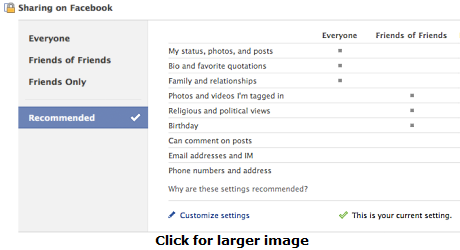Facebook privacy settings 'better'; doesn't undo the damage already done

Facebook has bowed to media and public pressure and 'simplified' its privacy controls. But changing something on the surface without modifying the underlying problem is like painting over mould, or... well, that analogy works quite well on its own, frankly.
In a nutshell, we have:
The above shows a clearer view of who can see what exactly. It also goes into detail of specifics, such as who can comment on your individual posts, likes and suchlike. You can of course go into detail yourself and customise further settings, but this way it allows Facebook to do most of the leg work for you.
Although, in respect to what Facebook has already done to your eroding privacy principles, I would be more inclined to really look into what the privacy settings mean because as many will know - what Facebook says, and what Facebook does are two very separate things.
And then there is this beauty:
Application control seems to have been tightened up, with more emphasis on "spammy" applications - with an interesting switch - allowing you to turn off applications altogether. Those who are looking into joining careers and organisations of a more 'secret' nature may want to use this to tighten the noose around your data and information privacy.
And the privacy policy has been made shorter, more concise and a bit easier to read, understand and take into account. It doesn't really change that much though, to be honest, and still means you sign away your life to the social network when you sign up and add any content; this, unlike the 2005 liberal attitudes they had when they first started out, and didn't realise the potential for money making that data harvesting would have.
There is just one thing that niggles me though.
While they have admittedly tightened up their privacy and security controls, the damage has already been done to most profiles and the information has been leaking like a BP oil rig in the Gulf of Mexico - fast, with little responsibility or care about what's being done to the wider environment.
Facebook's statement earlier on today states:
Not changing anything about our advertising programs: we never sell any of your personal information to anyone. There's a rumor that the more openly you share your information the more money we make, but it's just wrong. Advertisers may target ads to people according to certain demographics, but they receive only anonymous data reports. We don’t share your personal information with our advertisers.
This may or may not be true. Frankly, neither do I care nor does it matter. When a company or organisation changes its ways based on public pressure, you can clearly see that the morals and values are in the wrong place. Ideally, a company which takes action to prevent these issues, such as preventative measures like security and bug fixing, is an admirable thing and allows the public to at least feel safer.
Just take this most recent example, of a simple client-side script allowing the user to view hundreds of thousands of peoples' mobile phone numbers which have been added in part to those 'I'm an idiot and lost my phone' groups. You can read more about the background of the site here.
Some may argue a false sense of security is worse than not actually being secure at all - but in the case of Facebook, the user, and myself am included in this though I have heeded my own advice and warning - have no alternative to use it and would be socially ostracised if the 'addiction' wasn't met.
Our data has flooded the web and has been harvested by third party application developers and God knows who els. There have been so little controls in place to prevent our own stupidity that the company has simply allowed this to happen for the sake of money, at the end of the day.
To use a '24' analogy, you can open the borders and allow the terrorists and nuclear weapons to walk in, but by closing the gates doesn't mean that the weapon and those who mean ill harm aren't already on home turf.
If I didn't face social ostracisation or exclusion, I would have shut down my Facebook profile weeks, if not months ago. These new privacy settings mean jack squat and are only being rolled out to satisfy the press-hungry needs of the wider reading public.
